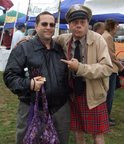Rick Joyner on Wheat and Tares
Morning Star's Rick Joyner has written an article on Discerning the Wheat From the Tares. He writes about mature and immature prophets. In this context he says, in part:Young, immature prophetic people will often behave unskilled, and we will be tempted to think that they are really "tares" instead of "wheat." Those who do not listen to the wisdom of the Lord, and try to weed out the tares prematurely, often throw out the "wheat" and keep the "tares."I'm still looking for a scriptural reference to training schools for the biblical prophets. Joyner then sites the Apostle Paul as a maturing apostle, using him as an example of how an apostle can mature, and in the same way, a prophet can mature. He writes:
Many churches and church leaders want the prophetic, but only after it has become mature. Of course, this would be easier in the short-term, but would actually be very costly in the end. It is by going through the "maturity process," and learning the nature of each from the maturing of both the wheat and tares, that a church and its leadership are prepared to handle the responsibility of a mature prophetic ministry. It is also the way we will be able to discern the false.
I have watched a number of times as churches and ministries rejected immature prophetic people because they still had problems. These same churches and ministries are usually then deceived by a false prophet that inevitably causes much harm. They then blame their problems on "the prophetic."
We should also begin to recognize the tares that are among the wheat in any movement as they mature. One of the great examples of how the wheat matures is the Apostle Paul. In one of his early letters, he stated that he was not inferior to even the most eminent apostles (see II Corinthians 11:5). He wrote about five years later that he was the "least of the apostles" (see I Corinthians 15:9). In a letter he wrote about five years after this, he stated that he was "the least of the saints"(see Ephesians 3:8. In one of his last letters, he declared himself to be "the greatest of sinners" (see I Timothy 1:15. He kept seeing himself as less important, though he was obviously growing in spiritual stature, and actually was one of the most important first century apostles.I don't believe Paul was really bragging in 2 Cor. 11:5. According to most commentaries, in context, it would appear that Paul was referring to the term the false teachers used for the real apostles, where the false teachers mockingly referred to super apostles. He wasn't puffed up with pride, as Joyner would suggest.
Secondly, Joyner appeals to 1 Corinthians 15:9 to show that Paul was a little more humble than he was five years previously. Besides the fact that most people place the two letters not more than a year apart, Joyner has 1 Corinthians written five years AFTER 2 Corinthians! Correcting Joyner's error, and using Joyner's logic, that would mean Paul was backsliding, not maturing! So much for that theory!
Finally, it is faulty reasoning to think that, because an apostle can mature, a prophet can as well. Prophets were called on to be 100% correct 100% of the time.
Labels: Rick Joyner


2 Comments:
I think that's the pot calling the kettle black.
I am not for one moment supporting Rick Joyner - I personally believe he is not just a heretic but very dangerous and deceptive, and C Peter Wagner and his elite round table of false prophets is 'antichrist'. I do not accept most of what they say about anything, least of all the prophetic.
However, that said true prophets can and DO mature as all Christians should. We 'prophesy according to faith', and should grow in faith and spiritual stature and favour, with increased faith and knowledge of God and his ways as we do so. With increased spiritual growth and personal maturity in our walk, so does, or should, the prophetic increase. Likewise as our spiritual ears and eyes can understand better and become more attuned we understand better how God talks to us, we grow as we also discern what is and what is not God's voice.
Prophets DO therefore grow. Note this is NOT to do with their accuracy once in ministry - I do not agree with the neo-prophets saying it is OK to be half right once in ministry - BUT it is a growth with increased vision, clarity, scope and revelation and even authority. So a true prophet once in ministry will be accurate but over time will grow.
>training schools for the biblical >prophets.
Samuel was taught by Eli how to listen to God's voice. Likewise, there was a 'school' of the prophets in the OT, where I believe flint sharpened flint.
http://www.endtimespropheticwords.wordpress.com/
Post a Comment
<< Home